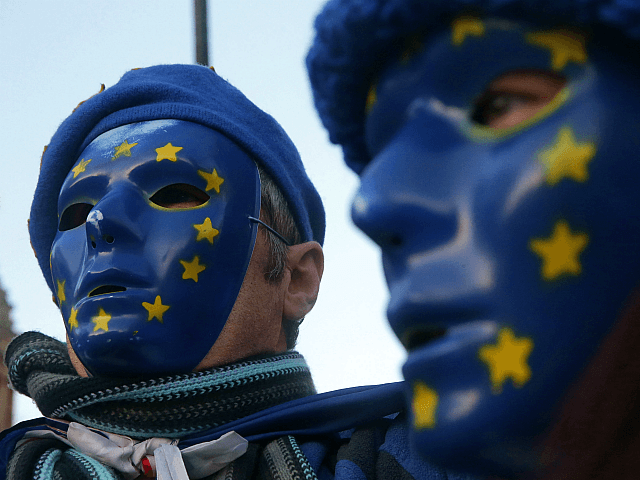The European Union (EU) is less than a month away from voting to introduce aggressive new online copyright laws and “widespread censorship” measures, which critics say could strangle new media websites and stifle satire and online meme culture.
Unelected European Commission bureaucrats have drafted legislation which detractors say could force online platforms to monitor and control all uploads to some platforms with “content recognition technologies”. They are also said to have proposed what has been termed a ‘link tax’, which could compel blogs and other websites to pay just to reference content.
The full effects of the legislation are still unclear, but critics allege that memes, remixes, and other types of user-generated content could be put at risk, as these could technically be seen as breaches of copyright — and so could sharing content on popular websites like Reddit, Tumblr, and Gab.
Others believe that the laws will hand well-resourced mainstream media firms an advantage over smaller alternative media groups that will struggle to comply with the sweeping new regulations. It is not clear how small news providers and even non-profit groups will be protected from harm.
The European Parliament is to vote on the copyright proposal late next month, namely Article 13 of the ‘Proposal for a Directive of the European Parliament and of the Council on copyright in the Digital Single Market.’
The ‘link tax’ was proposed in March by German Christian Democrat MEP Axel Voss, who has admitted extra copyright for news sites was “maybe not the best idea”.
“Whether the ancillary copyright laws will ultimately be the remedy, I do not know. It’s just an attempt to somehow improve this imbalance that prevails at the moment,” he said in an interview in February.
Julia Reda, a German Pirate Party MEP, has written that “these proposals are pandering to the demands of some news publishers to charge search engines and social networks for sending traffic their way, as well as the music industry’s wish to be propped up in its negotiations with YouTube.
“These proposals will cause major collateral damage – making many everyday habits on the web and many services you regularly use downright illegal, subject to fees or, at the very least, mired in legal uncertainty.”
She claimed in a separate article: “On the topic of copyright, you NOW have the chance to have an influence – a chance that will be long lost in two years, when we’ll all be ‘suddenly’ faced with the challenge of having to implement upload filters and the ‘link tax’ – or running into new limits on what we can do using the web services we rely on.”
A saveyourinternet.eu website and campaign have been launched, encouraging EU citizens and even those living outside the bloc to write to and tweet at MEPs, and demand the legislation is reconsidered.
“The European Commission and the Council want to destroy the Internet as we know it and allow big companies to control what we see and do online,” the website claims.
“Should Article 13 of the Copyright Directive proposal be adopted, it will impose widespread censorship of all the content you share online,” they add.
Similarly, a #savethelink campaign and website is pushing back against the ‘link tax’ as well as the copyright laws, claiming: “MEPs are about to cast their crucial votes on rules that could undermine the foundations of the web: the ability to link across the Internet, and the freedom to create online.”
They add: “The proposed law includes powers for media giants to charge licensing fees for posting links, through a new type of copyright, aka the link tax. It would also demand websites install bots to monitor your posts and censor them if copyrighted content is detected.”
The EU’s efforts to control and censor the Internet have been accelerating this year, with the unelected Commission last month ordering social media and tech firms like Facebook to delete content it considers “illegal” within one hour, threatening a new law.
Back in 2016, Facebook, Twitter, YouTube, and Microsoft voluntarily agreed to more rigorously censor “illegal online hate speech” by signing up to a so-called ‘Code of Conduct,’ parts of which the bloc wants to legally enforce.
In the code, the tech firms also promise to help the EU “criminalise” alleged perpetrators, as well as re-educate them by “promoting independent counter-narratives” that Brussels favours.

COMMENTS
Please let us know if you're having issues with commenting.